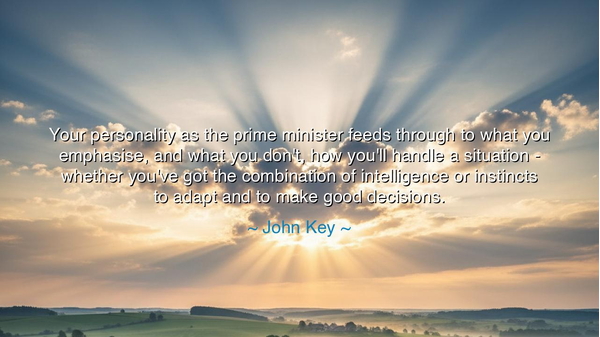
Your personality as the prime minister feeds through to what you
Your personality as the prime minister feeds through to what you emphasise, and what you don't, how you'll handle a situation - whether you've got the combination of intelligence or instincts to adapt and to make good decisions.






When John Key, the former Prime Minister of New Zealand, declared, “Your personality as the prime minister feeds through to what you emphasise, and what you don’t, how you’ll handle a situation — whether you’ve got the combination of intelligence or instincts to adapt and to make good decisions,” he was not speaking merely of politics, but of the essence of leadership. His words remind us that governance is not a matter of rules alone, nor of intellect alone, but of character made manifest through action. The fate of nations often turns not upon systems or slogans, but upon the temperament of those who lead — their capacity to balance wisdom with intuition, strategy with empathy, and power with restraint.
The origin of this quote lies in Key’s own journey from the world of finance into the realm of political leadership. He was a man forged in the crucible of both logic and pressure — a currency trader who understood numbers, and a prime minister who came to understand people. When he speaks of “personality feeding through,” he is describing a truth every ancient philosopher knew: that one cannot separate the ruler from the realm. The mind of a leader becomes the pulse of a nation; his virtues and his flaws are magnified through every policy, every crisis, every choice. The intelligence and instinct he speaks of are not abstract qualities — they are the twin pillars upon which all good leadership stands.
From the earliest days of civilization, the ancients understood this balance between intellect and instinct. Marcus Aurelius, the philosopher-king, ruled Rome not by the sword, but by the calmness of his reason, even as chaos swirled around him. Yet when reason alone could not save the empire, it was his instinct for mercy that preserved his legacy. Likewise, Alexander the Great, though taught by Aristotle, achieved greatness not merely through learning but through an uncanny intuition that allowed him to read men and moments alike. Both men embodied what John Key describes — the fusion of the rational and the instinctive, the capacity to think deeply and act swiftly when the hour demands.
Key’s words also carry a subtle warning. Many who ascend to positions of authority believe that intelligence alone will suffice. They gather facts, consult advisors, and master policy — yet fail to see that leadership is not an equation, but an art of perception. To govern wisely, one must understand not only the logic of decisions but the emotions that surround them. A crisis, for example, is not solved by analysis alone, but by the calm confidence that restores faith among the fearful. This is what Key means when he speaks of handling situations — it is the ability to meet uncertainty not with panic, but with presence.
History offers many examples of this truth. Consider Winston Churchill, who, during the darkest hours of war, blended cold strategic intelligence with fiery instinct. His intellect told him what could be done; his instinct told him what must be said. His speeches were not calculations — they were the voice of his spirit, lifting an entire nation from despair to courage. And yet, when peace returned, that same instinct made him too bold for calmer times. Thus, even greatness is governed by balance, for the qualities that save a nation in crisis may burden it in peace. This is the eternal paradox of leadership: that strength must learn humility, and intellect must yield to heart.
John Key’s reflection also reminds us that leadership is personal before it is political. The personality of a leader shapes the culture of his government, the morale of his people, and even the tone of a nation’s soul. A leader ruled by ego breeds arrogance in his circle; one ruled by fear breeds indecision. But a leader guided by character and adaptability inspires both trust and innovation. Key understood that to adapt is not to waver — it is to grow. The leader who refuses to change becomes a prisoner of his own pride; the one who listens, learns, and adjusts becomes the steward of his people’s future.
So, my child, learn from this: true leadership begins within. Whether you guide a nation, a company, or your own household, remember that your personality — your way of thinking, feeling, and acting — will ripple outward and shape all that you touch. Cultivate both intelligence and instinct, for one without the other is like a ship with only one oar. Read, reflect, and reason — but also listen, feel, and trust your inner sense when the path is unclear. For as John Key teaches, greatness is not found in those who never err, but in those who, through humility and perception, learn to make good decisions in the midst of uncertainty. And when your time comes to lead, let your leadership be not a performance, but an extension of your truest self — steady, wise, and awake to the needs of the world.






AAdministratorAdministrator
Welcome, honored guests. Please leave a comment, we will respond soon